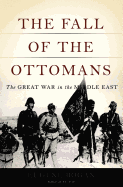
Western histories of the World War I often focus on the trench warfare on the Western front. When they discuss the campaigns at Gallipoli and in Mesopotamia, they generally tell the story from the Western point of view. In The Fall of the Ottomans: The Great War in the Middle East, historian Eugene Rogan (The Arabs: A History) looks at the war from the often-overlooked perspective of the Ottoman Empire.
Rogan's story is as complicated as the multi-ethnic empire at its heart. He describes the forces of internal revolution, external wars, lost provinces and lost confidence that led the Ottomans to seek an ally against Russian aggression in the early months of 1914--and how those same forces shaped Ottoman choices throughout the war. He tells the familiar stories of Gallipoli and the Mesopotamian campaign from an unfamiliar vantage point, and the less familiar story of Turkey's fight against Russia on the Caucasian front.
Perhaps the most interesting aspect of the book is the recurring question of the relative powers of Islam, national identity and ethnicity within the Ottoman world, beginning with Germany's unfulfilled hope that the Ottoman declaration of war would be seen as an act of jihad, thereby triggering rebellions among Muslim subjects of the British and French empires. Rogan handles the tricky subjects of jihad, secularism, Arab nationalism and Turkish paranoia about a possible Armenian fifth column with historical precision and a keen awareness of their implications for the modern world. --Pamela Toler, blogging at History in the Margins

